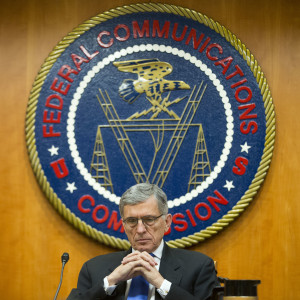A group of lawyers and academics criticized the Federal Communications Commission’s proposed privacy rules for internet service providers during the agency’s recent comment period, and predicted the proposal — based on decades-old telephone service provider rules — will hamstring one half of the internet ecosystem.
The International Center for Law and Economics (ICLE), a regulatory think tank based in Portland, Oregon, partnered with professors from the Pepperdine School of Law, Michigan State University College of Law, Boston College Law School, Nebraska College of Law and the Emory University Department of Economics to urge the FCC away from inflexible rules for handling consumer data.
“The commission’s NPRM [Notice of Proposed Rulemaking] would shoehorn the business models of a subset of new economy firms into a regime modeled on thirty-year-old CPNI [Customer Proprietary Network Information] rules designed to address fundamentally different concerns about a fundamentally different market,” the comments read.
The FCC voted in March to advance the NPRM, which would force Internet service providers like Comcast and Verizon to obtain consent from their subscribers before monetizing their data. Instead of an “opt out” typically offered by web companies, ISPs would be limited in their ability to monetize user data unless a customer decides to “opt in.”
Critics say subjecting ISPs to opt-in requirements will put one half of the online ecosystem at a disadvantage, giving edge providers like Google and Facebook an even surer foothold as the dominant entities in the digital targeted advertising market.
“[O]pt-in regimes may tend to favor the status quo, and to maintain or grow the position of a few dominant firms,” the filing reads. “Opt-in imposes additional costs on consumers and hurts competition — and it may not offer any additional protections over opt-out.”
Commissioner Ajit Pai, one of the FCC’s two Republicans, agreed during a May congressional hearing the rules would do little to protect consumer privacy, given the breadth of data collected by entities unaddressed by the rules in the smartphone, operating system and edge provider markets.
“In the absence of any meaningful evidence or rigorous economic analysis to the contrary, the commission should eschew imposing such a potentially harmful regime on broadband and data markets,” ICLE and others wrote.
Chairman Tom Wheeler has defended the rules as a natural outgrowth of the FCC’s decades-old regulations over how telephone providers use subscriber information. The agency claimed jurisdiction over ISPs last year after adopting Wheeler’s net neutrality plan to reclassify ISPs under the same common carrier designation as telephone companies.
Prior to the 2015 Open Internet Order, ISPs were held to the same privacy standards as edge providers under the Federal Trade Commission’s case-by-case enforcement approach — a model ICLE and academics encouraged the FCC to emulate.
“[T]he commission has not made a convincing case that discrimination between ISPs and edge providers makes sense for the industry or for consumer welfare,” the comments read. “The overwhelming body of evidence upon which other regulators have relied in addressing privacy concerns urges against a hard opt-in approach.”
“That same evidence and analysis supports a consistent regulatory approach for all competitors, and nowhere advocates for a differential approach for ISPs when they are participating in the broader informatics and advertising markets.”
During a hearing in May discussing the rules Wheeler told Congress that while many are aware edge providers collect their data, many are unaware ISPs do the same. He added internet providers shouldn’t have anymore information about what a user does online than a telephone company should know the content of customer phone calls.
“When I made a phone call to order something, and then got on the mailing list of Hammacher Schlemmer, that was between me and Hammacher Schlemmer,” Wheeler said. “The network delivered me there without taking my information.”
Wheeler previously said the rules would take broad strokes from the FTC’s privacy regime, and added the rules were an important step in reversing the digital economy’s “retreat from privacy.”
ICLE and others said despite Wheeler’s stated intention, numerous present and past FTC officials, including Commissioner Maureen Ohlhausen and former FTC Chairman Jon Leibowitz, have lobbied against the FCC’s more rigid rulemaking approach.
“Forbidding actions that do not harm consumers is at best, useless, and at worst, actually harms consumers by forbidding beneficial business practices,” Ohlhausen told a panel in March.
She and Leibowitz have warned the rules’ potential to inhibit providers’ ability to monetize data will likely drive up the monthly prices of broadband subscriptions.

